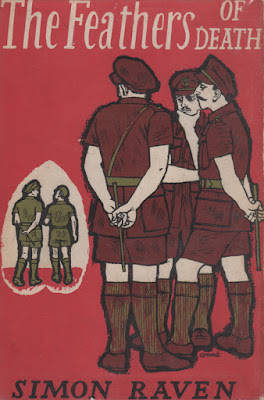 |
| London : Anthony Blond, 1959 |
The ship carrying the 121st Mounted Infantry (also known as Martock's Foot) lands at the fictional port of Eirene. After settling in, Harley is discovered to be drunk during the guard of honour for the General's departure. Lynch defends him and agrees to take him into his troop (and under his wing). Privately, the other officers are confused why Lynch has stood up for this boy and greatly concerned about just what sort of feelings Lynch has for him.
In a conversation with one of his fellow officers, Michael Byrt, Lynch confirms his feelings for Harley. When Byrt suggests that he is meant to have grown up since leaving school, Lynch replies, "Not a very clever observation. Some people 'grow up', as you put it, much later than others. Some never grow up at all. Or perhaps growing-up has nothing whatever to do with it." (p.106)
Tasked with patrolling English settlements to protect them from Karioukeya's Brigade, a group of natives actively fighting the colonization of their lands, Lynch's troops come under attack. During the fighting, Lynch shoots Harley and is brought before the court martial to determine whether he is guilty of murder. The relationship between Lynch and Harley, known among the other men, becomes the focus of the proceedings.
Rules about fraternization with locals and the prohibition of the use of prostitutes, creates a closed all-male environment that feels more like a boarding school than the modern military, maybe not surprising since the officers are barely out of school. The author reinforces this with the use of Greek place names as well as references to classic Greek military campaigns.
Bibliographies & Ratings: Young (3212, *)
No comments:
Post a Comment